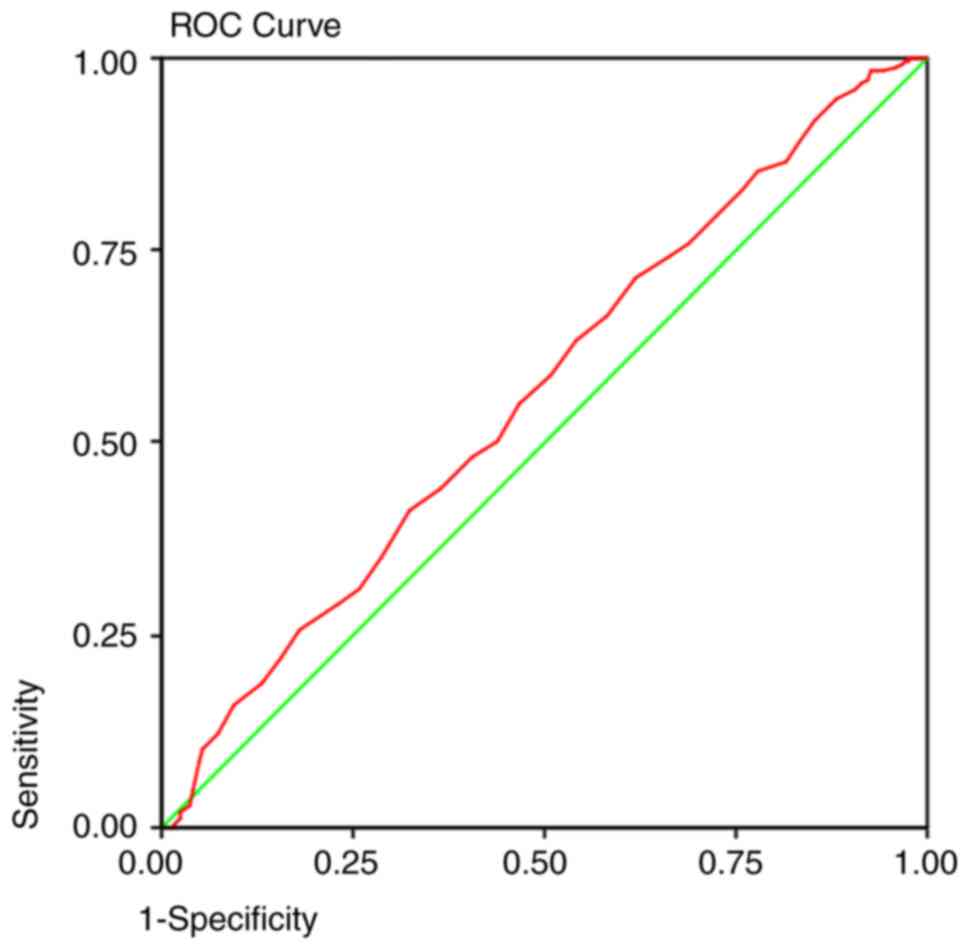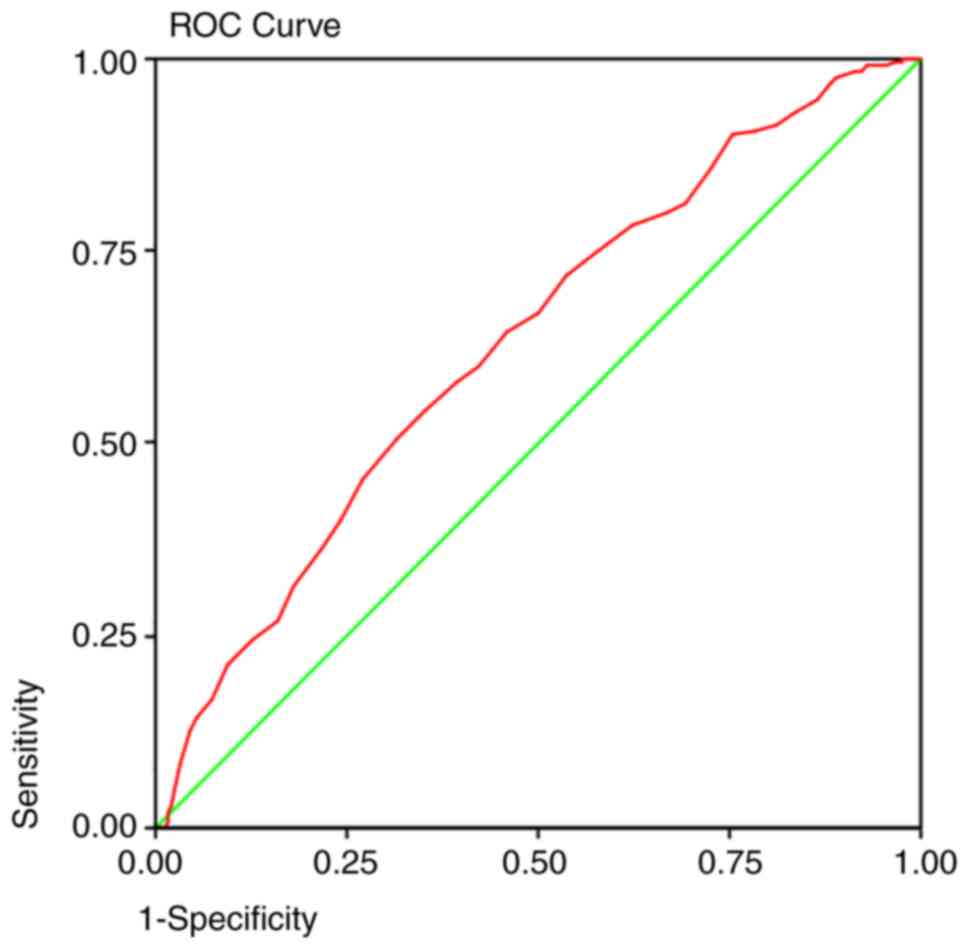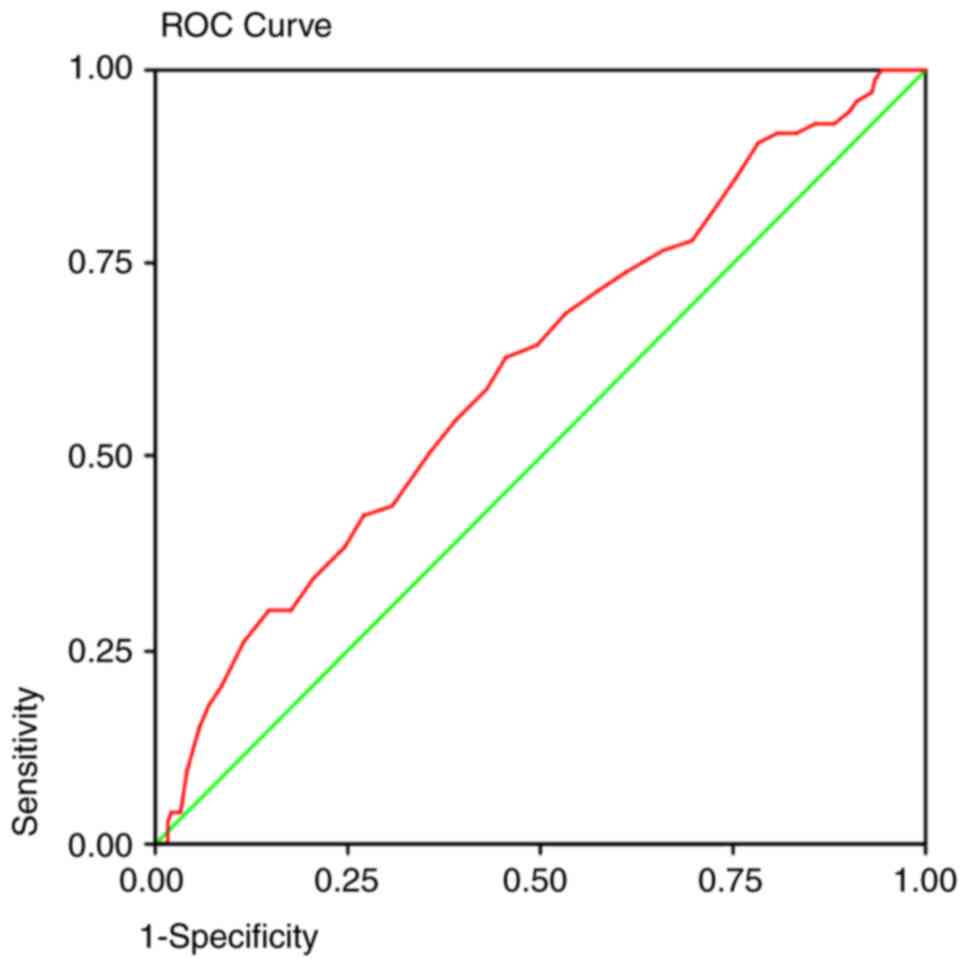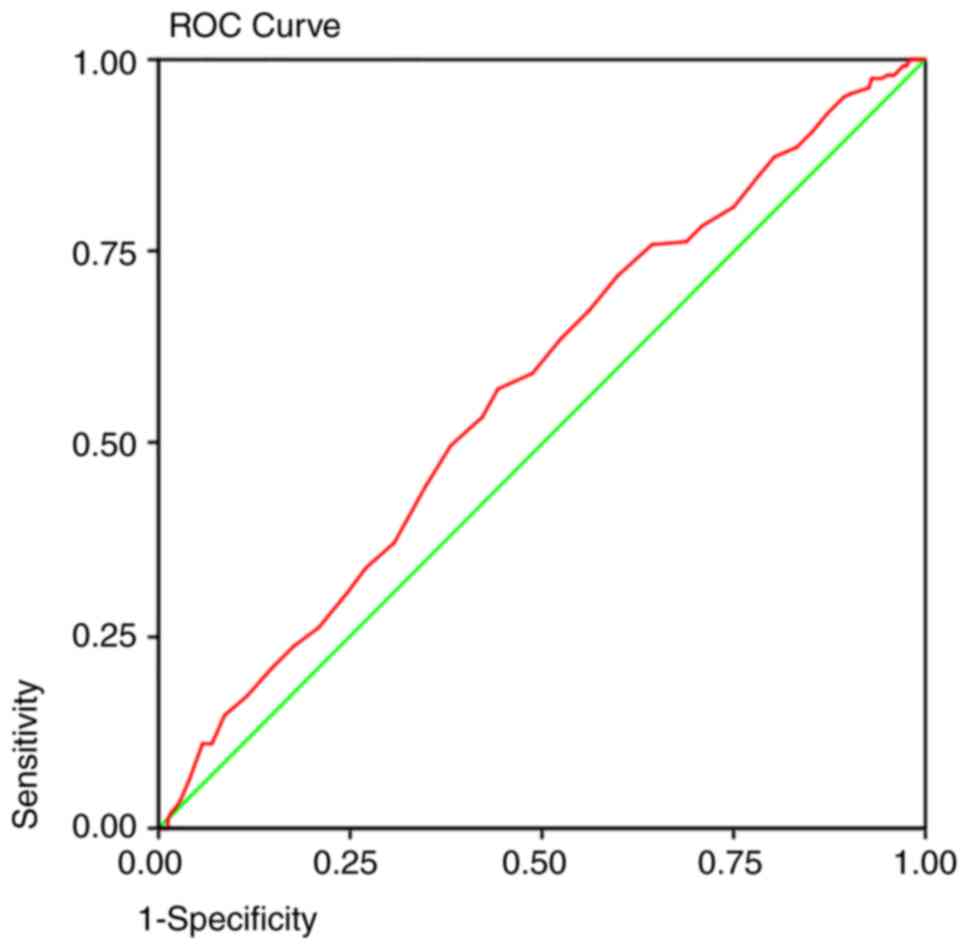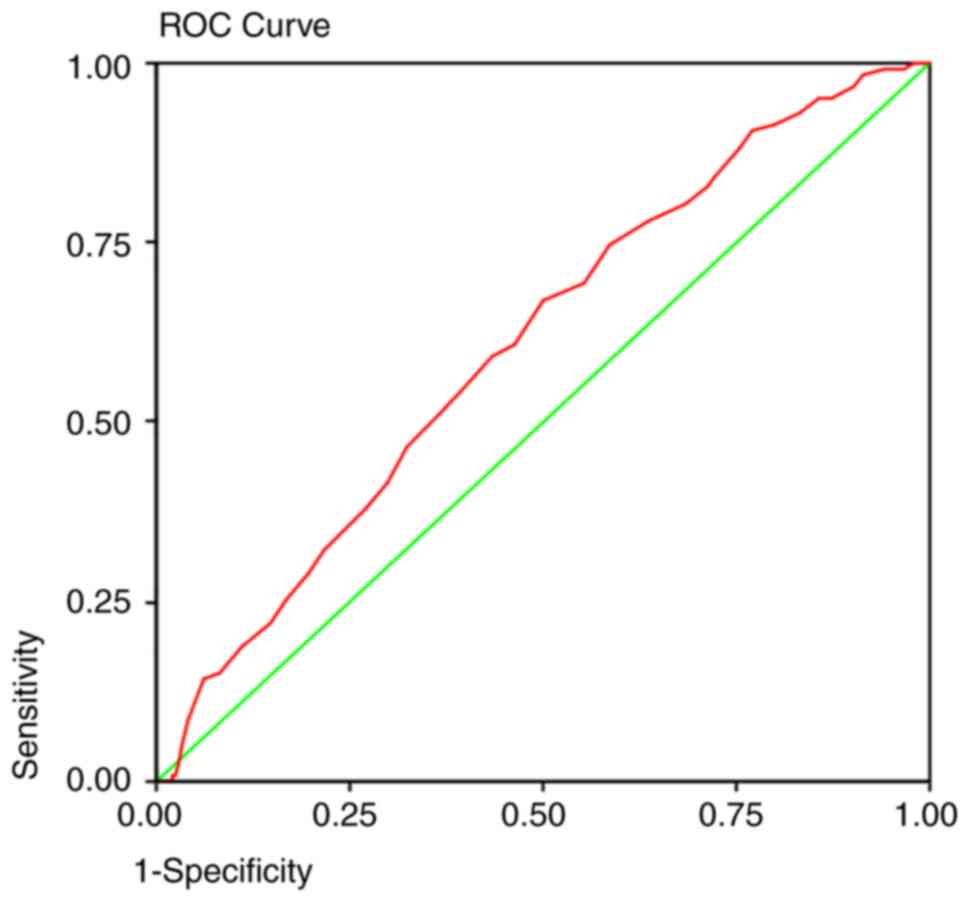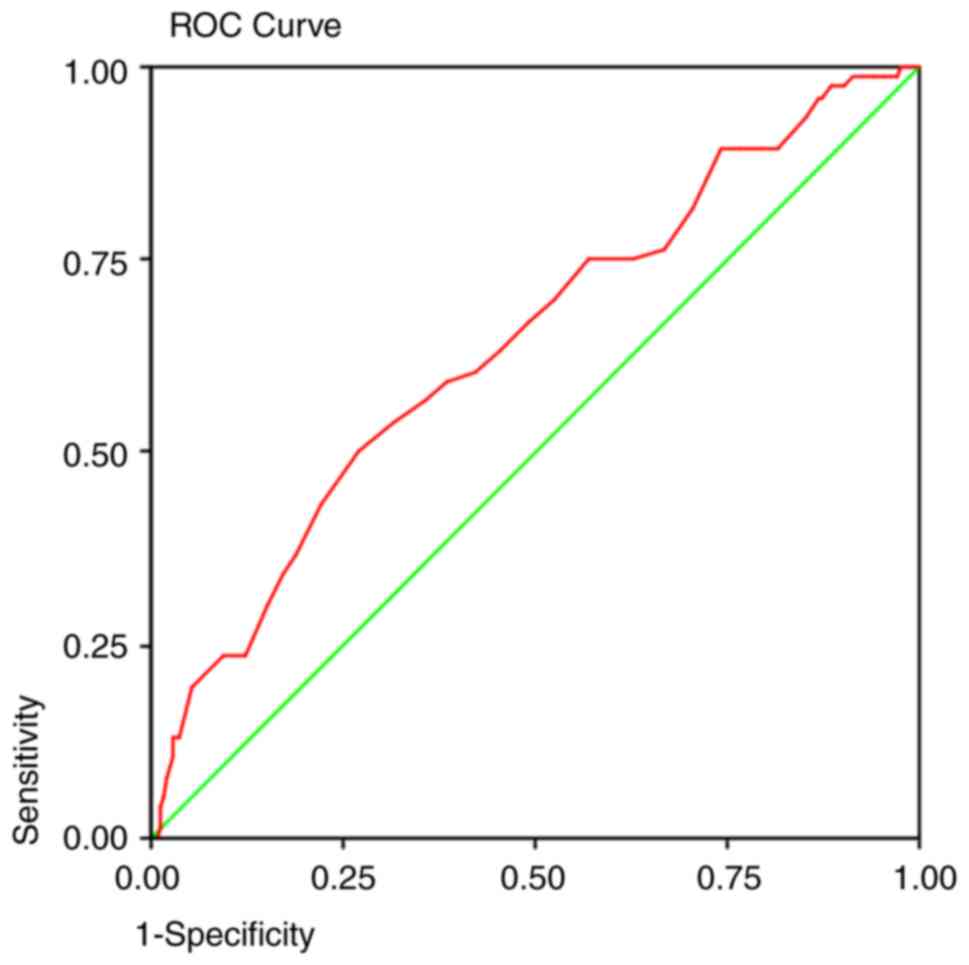|
1
|
Edwards BK, Noone AM, Mariotto AB, Simard
EP, Boscoe FP, Henley SJ, Jemal A, Cho H, Anderson RN, Kohler BA,
et al: Annual Report to the Nation on the status of cancer,
1975-2010, featuring prevalence of comorbidity and impact on
survival among persons with lung, colorectal, breast, or prostate
cancer. Cancer. 120:1290–1314. 2014.PubMed/NCBI View Article : Google Scholar
|
|
2
|
Jemal A, Ward EM, Johnson CJ, Cronin KA,
Ma J, Ryerson B, Mariotto A, Lake AJ, Wilson R, Sherman RL, et al:
Annual report to the Nation on the status of cancer, 1975-2014,
featuring survival. J Natl Cancer Inst. 109(djx030)2017.PubMed/NCBI View Article : Google Scholar
|
|
3
|
Henley SJ, Ward EM, Scott S, Ma J,
Anderson RN, Firth AU, Thomas CC, Islami F, Weir HK, Lewis DR, et
al: Annual report to the nation on the status of cancer, part I:
National cancer statistics. Cancer. 126:2225–2249. 2020.PubMed/NCBI View Article : Google Scholar
|
|
4
|
Siegel RL, Fedewa SA, Anderson WF, Miller
KD, Ma J, Rosenberg PS and Jemal A: Colorectal cancer incidence
patterns in the United States, 1974-2013. J Natl Cancer Inst.
109(djw322)2017.PubMed/NCBI View Article : Google Scholar
|
|
5
|
Exarchakou A, Donaldson LJ, Girardi F and
Coleman MP: Colorectal cancer incidence among young adults in
England: Trends by anatomical sub-site and deprivation. PLoS One.
14(e0225547)2019.PubMed/NCBI View Article : Google Scholar
|
|
6
|
Vuik FE, Nieuwenburg SA, Bardou M,
Lansdorp-Vogelaar I, Dinis-Ribeiro M, Bento MJ, Zadnik V, Pellisé
M, Esteban L, Kaminski MF, et al: Increasing incidence of
colorectal cancer in young adults in Europe over the last 25 years.
Gut. 68:1820–1826. 2019.PubMed/NCBI View Article : Google Scholar
|
|
7
|
Bhandari A, Woodhouse M and Gupta S:
Colorectal cancer is a leading cause of cancer incidence and
mortality among adults younger than 50 years in the USA: A
SEER-based analysis with comparison to other young-onset cancers. J
Investig Med. 65:311–315. 2017.PubMed/NCBI View Article : Google Scholar
|
|
8
|
Ohri A, Robinson A, Liu B, Bhuket T and
Wong R: Updated assessment of colorectal cancer incidence in the
U.S. by age, sex, and race/ethnicity. Dig Dis Sci. 65:1838–1849.
2020.PubMed/NCBI View Article : Google Scholar
|
|
9
|
Troeung L, Sodhi-Berry N, Martini A,
Malacova E, Ee H, O'Leary P, Lansdorp-Vogelaar I and Preen DB:
Increasing incidence of colorectal cancer in adolescents and young
adults aged 15-39 years in Western Australia 1982-2007: Examination
of Colonoscopy History. Front Public Health. 5(179)2017.PubMed/NCBI View Article : Google Scholar
|
|
10
|
Frostberg E and Rahr HB: Clinical
characteristics and a rising incidence of early-onset colorectal
cancer in a nationwide cohort of 521 patients aged 18-40 years.
Cancer Epidemiol. 66(101704)2020.PubMed/NCBI View Article : Google Scholar
|
|
11
|
Singh KE, Taylor TH, Pan CG, Stamos MJ and
Zell JA: Colorectal cancer incidence among young adults in
California. J Adolesc Young Adult Oncol. 3:176–184. 2014.PubMed/NCBI View Article : Google Scholar
|
|
12
|
Crosbie AB, Roche LM, Johnson LM, Pawlish
KS, Paddock LE and Stroup AM: Trends in colorectal cancer incidence
among younger adults-Disparities by age, sex, race, ethnicity, and
subsite. Cancer Med. 7:4077–4086. 2018.PubMed/NCBI View Article : Google Scholar
|
|
13
|
Bokemeyer B, Bock H, Hüppe D, Düffelmeyer
M, Rambow A, Tacke W and Koop H: Screening colonoscopy for
colorectal cancer prevention: Results from a German online registry
on 269000 cases. Eur J Gastroenterol Hepatol. 21:650–655.
2009.PubMed/NCBI View Article : Google Scholar
|
|
14
|
Lowenfels AB, Williams JL, Holub JL,
Maisonneuve P and Lieberman DA: Determinants of polyp size in
patients undergoing screening colonoscopy. BMC Gastroenterol.
11(101)2011.PubMed/NCBI View Article : Google Scholar
|
|
15
|
Kolligs FT, Crispin A, Graser A, Munte A,
Mansmann U and Göke B: Risk factors for advanced neoplasia within
subcentimetric polyps: Implications for diagnostic imaging. Gut.
62:863–870. 2013.PubMed/NCBI View Article : Google Scholar
|
|
16
|
Panteris V, Vezakis A and Triantafillidis
JK: Should hot biopsy forceps be abandoned for polypectomy of
diminutive colorectal polyps? World J Gastroenterol. 24:1579–1582.
2018.PubMed/NCBI View Article : Google Scholar
|
|
17
|
Panteris V: The problem with cold snare
polypectomy of diminutive colorectal polyps. Scand J Gastroenterol.
55(1389)2020.PubMed/NCBI View Article : Google Scholar
|
|
18
|
Wolf AMD, Fontham ETH, Church TR, Flowers
CR, Guerra CE, LaMonte SJ, Etzioni R, McKenna MT, Oeffinger KC,
Shih YT, et al: Colorectal cancer screening for average-risk
adults: 2018 guideline update from the American Cancer Society. CA
Cancer J Clin. 68:250–281. 2018.PubMed/NCBI View Article : Google Scholar
|
|
19
|
Bénard F, Barkun AN, Martel M and von
Renteln D: Systematic review of colorectal cancer screening
guidelines for average-risk adults: Summarizing the current global
recommendations. World J Gastroenterol. 24:124–138. 2018.PubMed/NCBI View Article : Google Scholar
|
|
20
|
Rex DK, Boland CR, Dominitz JA, Giardiello
FM, Johnson DA, Kaltenbach T, Levin TR, Lieberman D and Robertson
DJ: Colorectal cancer screening: Recommendations for physicians and
patients from the U.S. Multi-society task force on colorectal
cancer. Gastroenterology. 153:307–323. 2017.PubMed/NCBI View Article : Google Scholar
|
|
21
|
Navarro M, Nicolas A, Ferrandez A and
Lanas A: Colorectal cancer population screening programs worldwide
in 2016: An update. World J Gastroenterol. 23:3632–3642.
2017.PubMed/NCBI View Article : Google Scholar
|
|
22
|
Altobelli E, Lattanzi A, Paduano R,
Varassi G and di Orio F: Colorectal cancer prevention in Europe:
Burden of disease and status of screening programs. Prev Med.
62:132–141. 2014.PubMed/NCBI View Article : Google Scholar
|
|
23
|
Boursi B, Halak A, Umansky M, Galzan L,
Guzner-Gur H and Arber N: Colonoscopic screening of an average-risk
population for colorectal neoplasia. Endoscopy. 41:516–521.
2009.PubMed/NCBI View Article : Google Scholar
|
|
24
|
Yang MH, Rampal S, Sung J, Choi YH, Son
HJ, Lee JH, Kim YH, Chang DK, Rhee PL, Rhee JC, et al: The
prevalence of colorectal adenomas in asymptomatic Korean men and
women. Cancer Epidemiol Biomarkers Prev. 23:499–507.
2014.PubMed/NCBI View Article : Google Scholar
|
|
25
|
Hong SN, Kim JH, Choe WH, Han HS, Sung IK,
Park HS and Shim CS: Prevalence and risk of colorectal neoplasms in
asymptomatic, average-risk screenees 40 to 49 years of age.
Gastrointest Endosc. 72:480–489. 2010.PubMed/NCBI View Article : Google Scholar
|
|
26
|
Hemmasi G, Sohrabi M, Zamani F, Ajdarkosh
H, Rakhshani N, Khoonsari M, Ameli M and Hatami K: Prevalence of
colorectal adenoma in an average-risk population aged 40-50 versus
50-60 years. Eur J Cancer Prev. 24:386–390. 2015.PubMed/NCBI View Article : Google Scholar
|
|
27
|
Rundle AG, Lebwohl B, Vogel R, Levine S
and Neugut AI: Colonoscopic screening in average-risk individuals
ages 40 to 49 vs 50 to 59 years. Gastroenterology. 134:1311–1315.
2008.PubMed/NCBI View Article : Google Scholar
|
|
28
|
Strul H, Kariv R, Leshno M, Halak A,
Jakubowicz M, Santo M, Umansky M, Shirin H, Degani Y, Revivo M, et
al: The prevalence rate and anatomic location of colorectal adenoma
and cancer detected by colonoscopy in average-risk individuals aged
40-80 years. Am J Gastroenterol. 101:255–262. 2006.PubMed/NCBI View Article : Google Scholar
|
|
29
|
Leshno A, Moshkowitz M, David M, Galazan
L, Neugut AI, Arber N and Santo E: Prevalence of colorectal
neoplasms in young, average risk individuals: A turning tide
between East and West. World J Gastroenterol. 22:7365–7372.
2016.PubMed/NCBI View Article : Google Scholar
|
|
30
|
Hassan C, Pickhardt PJ, Kim DH, Di Giulio
E, Zullo A, Laghi A, Repici A, Iafrate F, Osborn J and Annibale B:
Systematic review: Distribution of advanced neoplasia according to
polyp size at screening colonoscopy. Aliment Pharmacol Ther.
31:210–217. 2010.PubMed/NCBI View Article : Google Scholar
|
|
31
|
Butterly LF, Chase MP, Pohl H and Fiarman
GS: Prevalence of clinically important histology in small adenomas.
Clin Gastroenterol Hepatol. 4:343–348. 2006.PubMed/NCBI View Article : Google Scholar
|
|
32
|
Gupta N, Bansal A, Rao D, Early DS,
Jonnalagadda S, Wani SB, Edmundowicz SA, Sharma P and Rastogi A:
Prevalence of advanced histological features in diminutive and
small colon polyps. Gastrointest Endosc. 75:1022–1030.
2012.PubMed/NCBI View Article : Google Scholar
|
|
33
|
Brenner H, Hoffmeister M, Stegmaier C,
Brenner G, Altenhofen L and Haug U: Risk of progression of advanced
adenomas to colorectal cancer by age and sex: Estimates based on
840,149 screening colonoscopies. Gut. 56:1585–1589. 2007.PubMed/NCBI View Article : Google Scholar
|
|
34
|
Vleugels JLA, Hazewinkel Y, Fockens P and
Dekker E: Natural history of diminutive and small colorectal
polyps: A systematic literature review. Gastrointest Endosc.
85:1169–1176.e1. 2017.PubMed/NCBI View Article : Google Scholar
|
|
35
|
Pickhardt PJ, Kim DH, Pooler BD, Hinshaw
JL, Barlow D, Jensen D, Reichelderfer M and Cash BD: Assessment of
volumetric growth rates of small colorectal polyps with CT
colonography: A longitudinal study of natural history. Lancet
Oncol. 14:711–720. 2013.PubMed/NCBI View Article : Google Scholar
|
|
36
|
Meza R, Jeon J, Renehan AG and Luebeck EG:
Colorectal cancer incidence trends in the United States and United
kingdom: Evidence of right- to left-sided biological gradients with
implications for screening. Cancer Res. 70:5419–5429.
2010.PubMed/NCBI View Article : Google Scholar
|
|
37
|
Haug U, Knudsen AB, Brenner H and Kuntz
KM: Is fecal occult blood testing more sensitive for left-versus
right-sided colorectal neoplasia? A systematic literature review.
Expert Rev Mol Diagn. 11:605–616. 2011.PubMed/NCBI View Article : Google Scholar
|
|
38
|
Massat NJ, Moss SM, Halloran SP and Duffy
SW: Screening and primary prevention of colorectal cancer: A review
of sex-specific and site-specific differences. J Med Screen.
20:125–148. 2013.PubMed/NCBI View Article : Google Scholar
|
|
39
|
Agrawal S, Bhupinderjit A, Bhutani MS,
Boardman L, Nguyen C, Romero Y, Srinivasan R and Figueroa-Moseley
C: Committee of Minority Affairs and Cultural Diversity, American
College of Gastroenterology. Colorectal cancer in African
Americans. Am J Gastroenterol. 100:515–523; discussion 514.
2005.PubMed/NCBI View Article : Google Scholar
|
|
40
|
Fairley TL, Cardinez CJ, Martin J, Alley
L, Friedman C, Edwards B and Jamison P: Colorectal cancer in U.S.
adults younger than 50 years of age, 1998-2001. Cancer. 107 (Suppl
5):S1153–S1161. 2006.PubMed/NCBI View Article : Google Scholar
|
|
41
|
Knudsen AB, Zauber AG, Rutter CM, Naber
SK, Doria-Rose VP, Pabiniak C, Johanson C, Fischer SE,
Lansdorp-Vogelaar I and Kuntz KM: Estimation of benefits, burden,
and harms of colorectal cancer screening strategies: Modeling study
for the US preventive services task force. JAMA. 315:2595–2609.
2016.PubMed/NCBI View Article : Google Scholar
|















